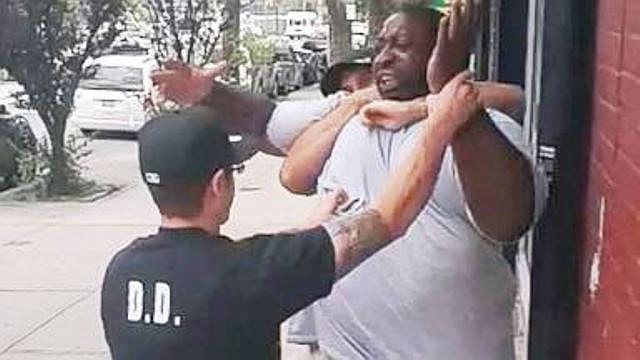Rauner Signs Bill Prohibiting Police Chokeholds, Establishing Guidelines for Body Cameras
Photo By: New York Daily News/Getty Images
When Kwame Raoul was a Ill. state prosecutor, he recalls getting patted down by police officers as he exited his car in an area south of downtown Chicago on Financial Street.
“I was in a suit and a tie,” said Raoul, now a state senator, (Dist.-13). “They started asking me to put my hands on my car. Then they find out who I am and become friendly and say that I fit the description of someone who was committing auto theft. . .They could see that I had keys.”
The incident, which occurred nearly two decades ago, is one of the reasons Raoul pushes for law enforcement reforms.
Last week, Illinois Gov. Bruce Rauner signed what many lawmakers are calling a sweeping change in law enforcement, a bill prohibiting chokeholds and establishing guidelines for the use of body cameras.
Raoul was the lead sponsor of the bill.
“Today we are taking steps to strengthen the relationship between our law enforcement officers and the public they protect with the Police and Community Improvement Act,” Rauner said in a prepared statement. As a society, we must ensure the safety of both the public and law enforcement. SB 1304 establishes new and important guidelines and training for police departments and their officers, while protecting the public by prohibiting officers from using excessive force. I thank the legislators who sponsored this bill. It will have a lasting and positive impact on the people of Illinois.”
The new law is being credited by some law enforcement experts as the first of its kind nationally and comes as police are facing scrutiny throughout the nation for controversial traffic stops of African Americans, some deadly.
Both state Republicans and Democrats supported the bill.
In the measure, Illinois police officers are prohibited from applying chokeholds unless the use of deadly force is warranted.
The new law also requires police to fill out “receipts” for those individuals — including pedestrians — who are patted down but not arrested.
Police will have to detail the reason for stopping the person, the person’s race and record personal items taken from the person.
Specific guidelines are also required when police officers use body cams. However, police departments will not be required to use the cameras and the new law will establish a fund to help police departments pay for them by increasing traffic violation fines by $5. Officials also want federal funds to help pay for the devices.
Many police departments want the cameras. Studies show when cameras are used, complaints of police misconduct sharply decline. Chicago is using the cameras in some areas of the city.
Walter Farrell, an expert witness in criminal cases and retired social work professor at the University of North Carolina, said he believes cameras should be particularly useful in helping African-Americans who encounter bad cops.
“[Blacks] are the ones most likely to benefit from the camera,” Farrell said. “For us, it is an insurance policy to help have fewer deaths…My only problem is that jurisdictions can opt out of this.”
But it will be more difficult for bad police officers to emerge in other departments under the new law.
The measure creates a database of officers who have been fired or resigned because of misconduct.
“One of the major goals is to create greater public confidence in law enforcement,” Raoul said.
Latest Stories
- One Night Only Performance Show Dance Company Entering ‘New Horizons’
- New Choice Intervention Provides Much Needed Mental Health Services To The Community
- University of Chicago Program Brings Mavis Staples To Campus
- Larry’s Barber College Set For Expansion Of Facility And Education Programs
- Art Exhibit Shows And Tells The Stories Of Widows
- Introducing Shot Bar's New Location
- Illinois Reparations Coalition Advocates for Guaranteed Income Program as Drug War Reparations
- Reps. Kelly, Balderson Introduce Legislation to Combat Scams Targeting Seniors
- Gov. Pritzker Highlights Proposal to Eliminate $1 Billion in Medical Debt
- Customers urged to stay connected if they are behind on bills
Latest Podcast
Sydney Blaylock-The local skater with national experience



